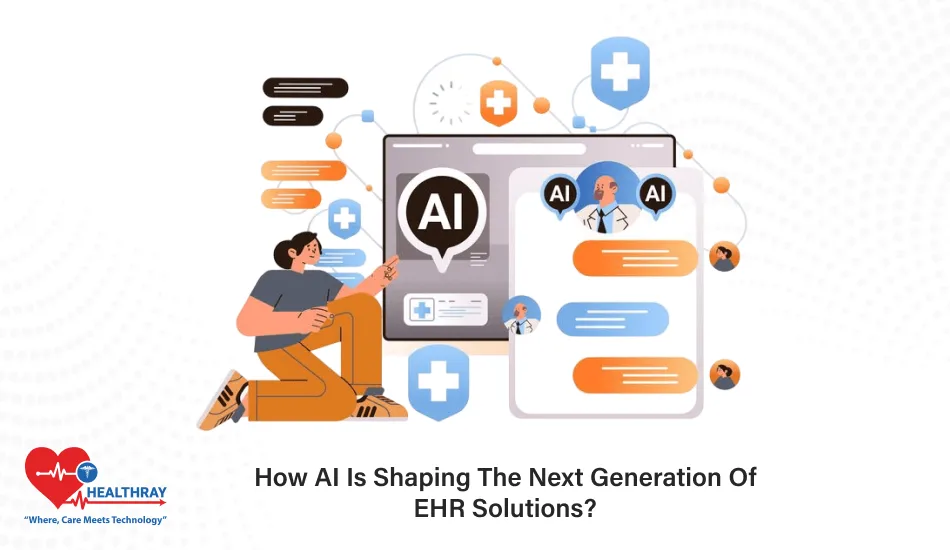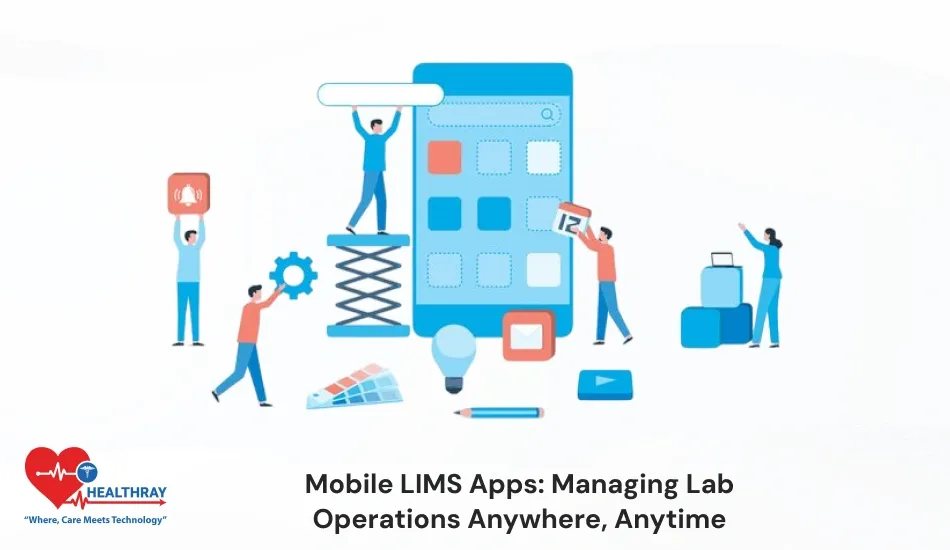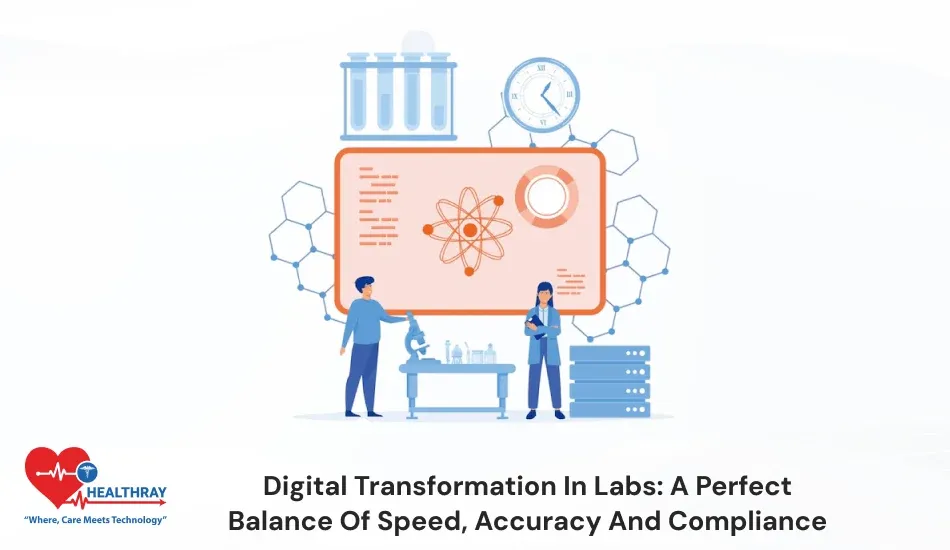Healthcare has forever existed at the forefront of technological innovation, and the Electronic Health Records (EHR) are no exception. They revolutionized the storage, accessibility, and management of patient data. However, frequent issues center around inconvenient entry of time, incomplete records, and limited analysis capabilities with older EHR systems, even though new technologies already provide efficient workflows with highly optimized data management and accessibility.
This is where input from artificial intelligence (AI) could usher in a revolution.
AI in EHR systems must be smart, not just fast. This is because they must provide insights, not just sort through paperwork, and relieve physician stress through heightened efficiency. But more importantly, AI equips the healthcare profession with tools to deliver a care regimen that is more personalized and proactive in nature.
In this article, we will explore the many ways AI is shaping the next generation of EHR Software. Going into the benefits such integration brings, the existing challenges, and what the future holds. If you have ever wanted to gain insight into the applications of artificial intelligence that are transforming healthcare from within, look no further.
Gains of AI linkage into EHRs
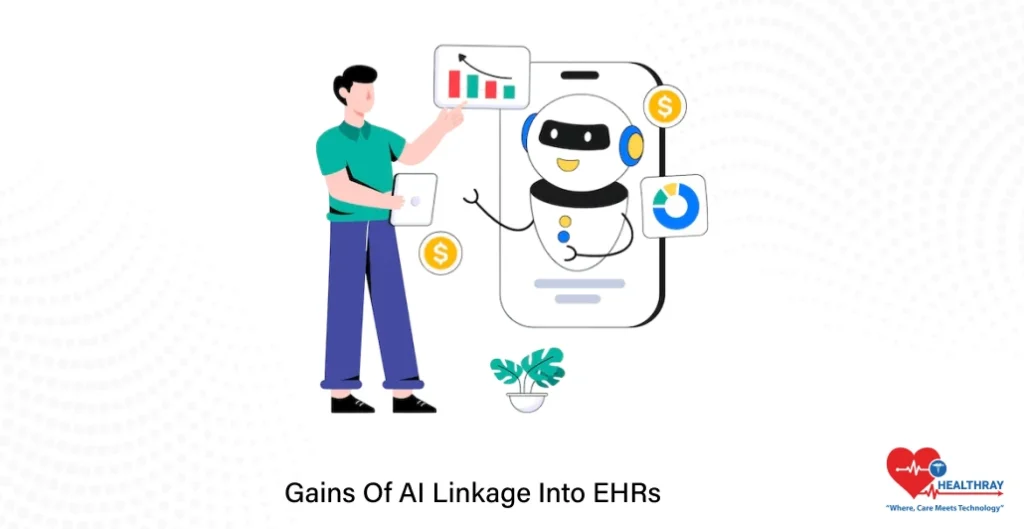
AI has really transformed EHRs from mere digital filing systems. To become something more intelligent besides being faster and more helpful to healthcare professionals. They let me spell out the few things to boot.
Streamlining Clinical Workflows
AI takes routine tasks and other activities—like scheduling appointments with patients, billing, or making entries-into the Ocean of Automation. AI takes away such administrative workload from healthcare providers, thus easing their workload and freeing them to focus on the real job of caring for patients.
Enhancing Decision Support
AI-integrated electronic health record systems would provide checks and reminders throughout the record-saving phase. Such AI robots are calibrated so that, given any raw patient data, the inevitable key algorithms can promptly provide a reminder, a pop-up to notify any specific flags, say, dangerous drug interactions or sudden changes in some of the vital signs of the patient. Such systems become a mirror to the human programmer, which lets them double-check the required case points.
Improving Patient Engagement
AI-driven tools keep patients engaged in taking an active role in their health. With the help of AI chatbot for healthcare, these patients may get answers to common queries, reminders about their medications, or scheduling of follow-ups. On the other hand, personalized patient portals receive vast help from AI as well by giving the patient personalized health insights and recommendations, a lot of which aid in their active care.
Reducing Physician Burnout
Besides the aforementioned burden of redundancies, one of the worst grievances any healthcare worker would have is the dreaded time taken for documentation-for that matter even after long hours of medical practice. AI helps to automate at least part of the note-taking, simplify the coding processes, and chop repetitive tasks. While saving a lot of time, such technologies make the lives of bedside doctors and nurses much easier.
Real-World Applications
In fact, many healthcare organizations have already begun to realize the benefits of AI-driven EHR systems. Reduced errors, fast processing of patients, and higher satisfaction both—staff and patient—are the claims still being forthrightly touted.
AI-Driven Clinical Documentation
Clinical documentation stands as the lengthiest task vertically in the world of healthcare, taking away hours that could be spent with the patients by the physicians. AI is turning around the clinical documentation into everything, a faster path of bedrock on the printed patient note; hence, the least administrative burden on the healthcare team. These few pages attempt to unravel how AI seems to be well on its destined future to revolutionize care delivery.
Preventing Documentation-Flame
NLP is a great tool for the clinical workforce, talking to docs in their native language and understanding human speech with text conversion; in this respect, AI transcription and speech-to-text applications generate text out of the voice. And in terms of mastery, this ton of notes written down by doctors right into the medical archives-high hopes went flying up that this can reduce the stress associated with the hidden curse of manual documentation! Long facial nerves and worked away fingers suddenly loosen up towards perpetual exuberance from today till infinity, with the birth of AI, in clinical documentation!
Auto-Note through NLP
Also considered in this regard are AI-enhanced Natural Language Processing (NLP)—this territory needs to be briefly introduced to complete this point. These systems go on capturing disease-related conversation between physicians and patients, structuring reports, tagging important medical terms, diagnosis, and medication procedure. They may detect something vital, leading practitioners into ensuring that it is not ignored.
S-T Applications
Right off the impact of voice recognition software, physicians are instructed to speak into the systems designed to capture their narratives. This completely does away with manual typing; hence, no more short-lived result and no possible errors or too-late cuts that might inevitably cause some transgressions later. These applications allow the system to offer transcriptions that perfectly say things within a contextual relevance.
Live Suggestions and Corrections
AI tools not only collect data but also analyze them. While AI powers its fully varied clinical course of events, the simplest and exact data can show discrepancies to errors: hence, midtreatment, while the clinician documents a case, AI should gently say, “Let me suggest the proper diagnostic code” or highlight inconsistencies so that the accuracy is maintained and compliance with medical standards granted.
Reducing Redundancies and Errors
Through AI-infused documentation, even entries that tend to be repeated-time and again-could well be identified and conked out, decluttering patient records. Identifying any possible outright wrongnesses, such as conflicting medication details, will assist in securing a quality medical record.
Optimizing Provider Satisfaction
When we seek to compensate for the time-consuming activities of healthcare professionals, we choose AI to do repetitive tasks so that professionals can engage in exclusive patient interaction. It has not only raised healthcare satisfaction but has also significantly increased the level of patient care.
Predictive Analytics and Personalized Care
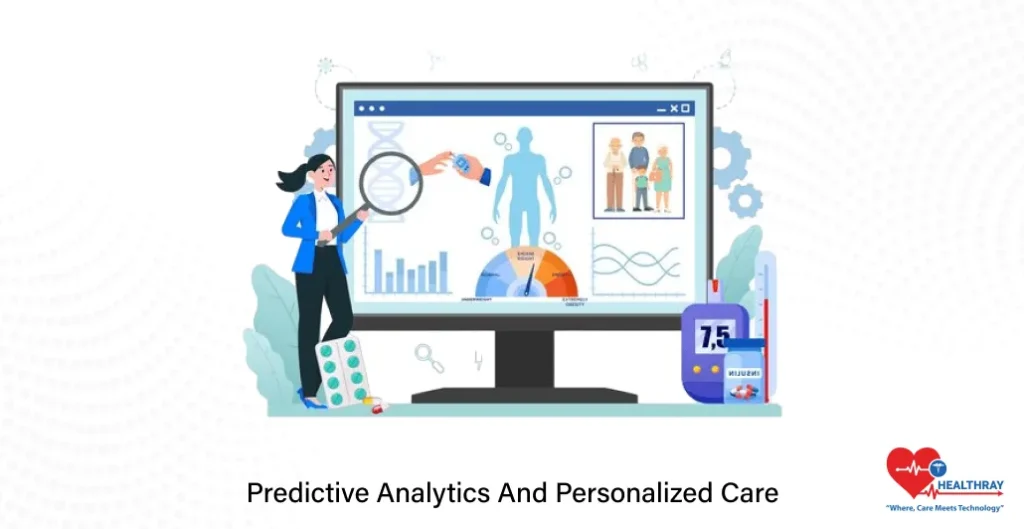
AI makes it ever so possible to analyze masses of patient healthcare data towards providing early warning on diseases and personalized treatments. It transforms predictive analytics as a life-saver because it is not just about forecasting but gauging the damage that has unfolded. Let’s hear about AI that sets the pace for reshaping healthcare delivery.
Early Diagnosis and Risk Prediction
AI algorithms could extend their analytic powers into patient health history, lab reports, even genetic datasets, and suggest likely health risks. Maybe some AI module could be a savior for example in pointing out likely early signals for chronic illnesses such as diabetes or heart disease before they appear in symptoms.
Personalized Treatment Plans
AI works on developing treatments particular to the needs of individual patients. Considering genetics along with lifestyle and medical history will help AI assist the clinician in deciding the best methods to get rid of this nuisance. More personalized than any of the human possibilities to this day, it allows for effective treatment and minimum side effects.
Reducing Hospital Readmissions
AI will predict the likelihood that discharged patients might re-enter a hospital. Based on accessible patterns within the patient’s data, preventive measures can be used by the clinician after discharge, such as regular follow-up visits or even a change in medication.
Improving resource allocation
The admission of patients can be predicted, and thus, staffing, bed availability, and resource allocation can be optimized with the help of AI-based analytics.
Empowering preventive care
AI provides support for preventive care programs by recognizing population health trends. One application is that public health agencies may use predictive models to prepare for flu seasons or outbreaks for better community health control.
Implementation Challenges and Solutions
The opportunities of applying AI to Electronic Health Records are, however, shadowed with challenges; thus, success in tackling these challenges is vital in order to benefit from AI opportunities in health care. Here are the primary challenges and workable solutions.
Data Privacy and Security Issues
Challenge- The systems require vast amounts of patient data, raising concerns, including violation of privacy regulations such as HIPAA. There is a risk of compromising sensitive health information through unauthorized access or through a data breach.
Solution- Use advanced encryption methods, multi-factor authentication, and periodic auditing. AI tools need to be clearly designed to embed privacy by default to anonymize data whenever possible.
Integration with Legacy Systems
Challenge- Most healthcare facilities rely on these outdated EHR platforms that are not meant for AI integration, and adding features to systems can lead to incompatibility.
Solution- Find middleware solutions to create a link between the old and new systems. Gradual migration to AI-friendly platforms should also be looked into to ensure that it minimally interrupts day-to-day activities.
High Implementation Costs
Challenge-This requires a huge financial investment in technology, infrastructure, and training so that AI-driven EHR systems can later be implemented.
Solution- Start with small-scale pilot projects, which demonstrate an adequate ROI, before expanding. Cloud-based AI services diminish upfront cost burdens through a pay-as-you-go approach.
Resistance to Change
Challenge- Techno phobia is another hurdle that encompasses the fear of being replaced and the stress of learning newer systems. All these factors will slow down adoption.
Solution- Training programs should concentrate on AI’s role as a cooperating partner, stressing that AI will support, and not replace, clinical decision-making. Encouraging and incorporating staff feedback will improve refinement in implementations.
Bias and Inaccuracy in AI Models
Challenge- If the data used to train AI systems is incomplete or not representative, their potential for bias makes the AI system erroneous in its predictions or treatment.
Solution- While training AI models, diverse and representative datasets should be used. Regular audits and updates will keep the models accurate and fair.
Regulatory and Ethical Concerns
Challenge- Financially reasoned regulations in healthcare concerning AI must also lead to the emergence of ethical dilemmas against the decisions made by AI systems.
Solution– Collaborative development with the regulatory bodies will ensure compliance. Clear guidelines will also need to be laid down on how AI will fit into the clinical decision-making mix.
Ensuring User-Friendly Interfaces
Challenge- Complex AI tools can intimidate the users, particularly if the said users are not that technology-savvy.
Solution- Down-prioritize any design that does not offer ease of use or could become an issue to its users. The interface should aid daily activities.
Future Trends in AI EHR Solution
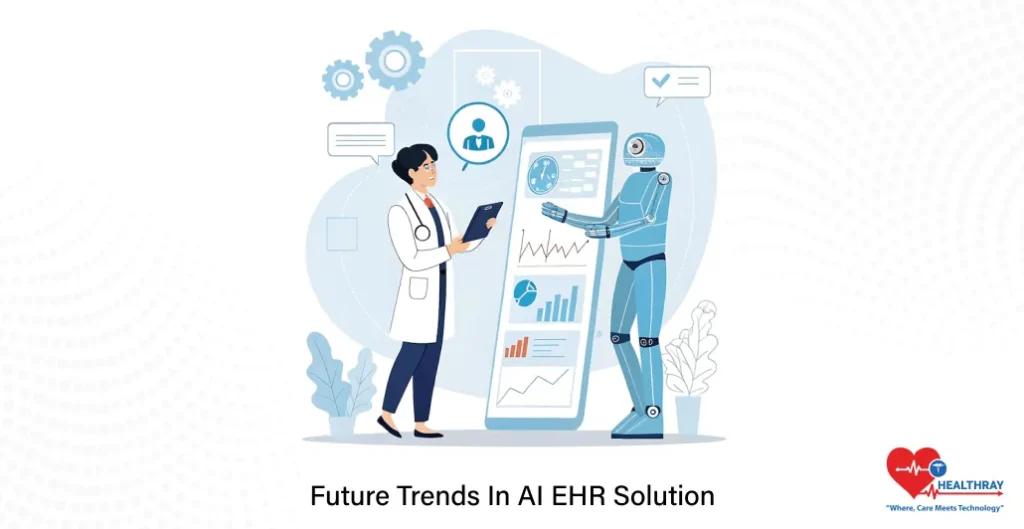
EHR is entering its future amidst the raging winds and the pessimism of AI development Services. Bolstering plans to get EHR systems smarter, learn better, and grow in relevance to both care professionals and patients. Here are insights about trends that may be present:
Generative AI for Clinical Applications
In parallel to basic forms of automation, AI is now being developed to solve creative problems. It is expected that generative AI models will assist in drafting patient summaries, generating treatment suggestions, and preparing personalized care plans. With these tasks taken care of, clinicians will be free to spend more time with patients and less on paperwork.
Predictive and Prescriptive Analytics
Already, predictive analytics is making waves in healthcare, but next is prescriptive analytics. These will not only predict health problems but also prescribe ways to prevent or intervene in treatment tailored for the individual patient.
Interoperability Across Systems
Future editions of EHR will most likely be working to support interoperability so that there is seamless transfer of data between differing health providers, devices, and platforms. AI will play its part to normalize and integrate data from disparate sources to paint a full picture of the patient’s state of health.
Real-Time Monitoring and Alerts
By working seamlessly with AI-based EHR systems, wearable devices and IoT sensors will monitor health in real-time. The wearables and sensors will alert them as soon as abnormal readings are detected so that their intervention may be sought before the condition worsens.
AI-Powered Virtual Health Assistants
AI-based assistants have opportunities for a greater role in aiding patients and providers. These tools provide medication reminders, symptom checkers, and tips to patients; providers are aided with tasks such as scheduling, documentation, and diagnostics through virtual assistants.
Advanced NLP for Contextual Understanding
NLP will be even more advanced to enable AI to possess contextual information within medical notes and conversations. This would improve not only documentation accuracy but ways in which information is organized and retrieved as well.
Decentralized Health Data with Blockchain
AI and blockchain technologies will likely merge to foster secure decentralized health records. Thereby, patients may have increased control over their health data, deciding who can actually access which records and how.
AI-Driven Population Health Management
The healthcare systems will thus be empowered through AI tools to analyze population health trends within a more organized way. It will identify at-risk groups, predict outbreaks, and efficiently allocate resources for enhanced community-level healthcare.
Continuous Learning Systems
Future EHRs powered by AI will be equipped for continuous learning so that they will be learning from real-world data and improving their performance over a period of time. This will, therefore, enhance the diagnostic prowess and make the prediction a bit more reliable.
Ethics in AI Implementation
With the AI systems’ deeper integration into EHR systems, ethical concerns would become increasingly important. Transparent AI algorithms with training data free from biases would become the stock standard requirement toward ensuring fairness and equity in the provision of healthcare.
Conclusion
The introduction of AI into Electronic Centers (EHR) is more than a change in technology; it is a conversion of paradigms for service delivery in the health sector. AI has the potential of converting EHR systems from mere record-keeping of patient data into actual tools for improving outcome.
The silver lining of opportunities available goes from the automation of day-to-day documentation to predicting health risks and aiding personalized treatment plans.
But the metamorphosis does face a number of challenges: data privacy, systems compatibility, and ethical issues. Solving these would, as it were, set up the healthcare institutions to tap into the full potential of AI-mined Hospital Management Systems.
In all probability, as the future unfolds, AI will become one with the EHR, creating a smarter, faster, and more patient-centric healthcare ecosystem. With this, it is high time for all providers, administrators, developers, and entrepreneurs to venture into and adopt AI-powered EHR solutions.
